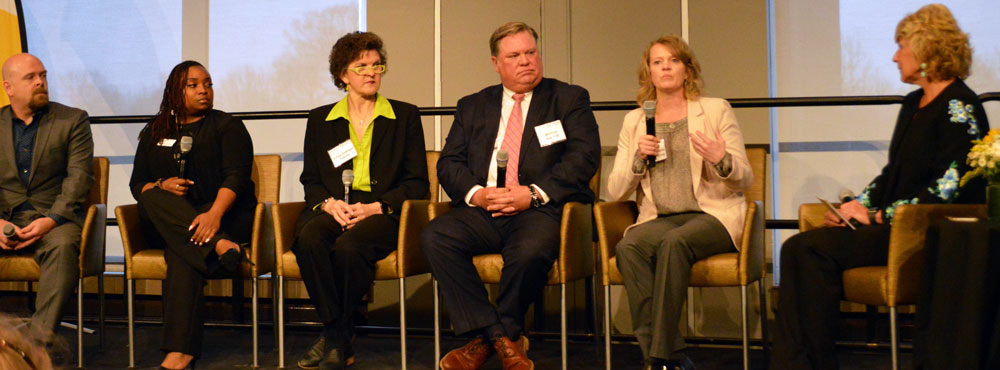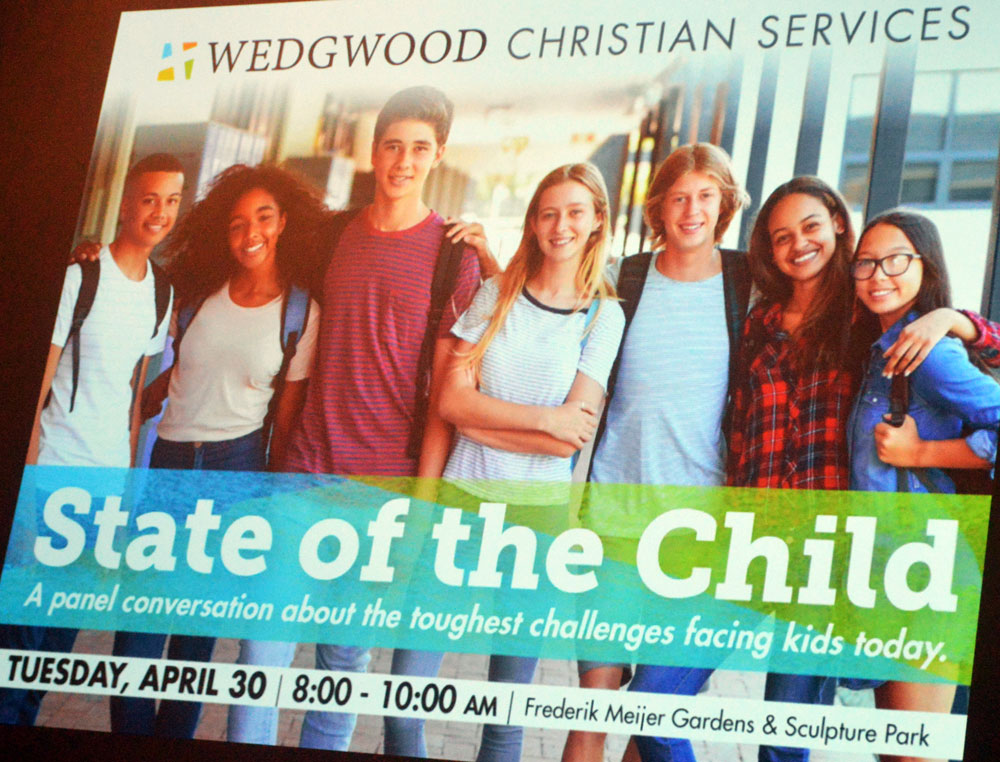What are the toughest challenges teenagers face?
Kent County adults who work with youth in various fields joined several high school students in addressing that question during Wedgwood Christian Services’ recent State of the Child event at Frederik Meijer Gardens. Weighty answers included: substance abuse, mental health, relationship issues, peer pressure and problems tied to social media use.
The adult panel included Kent County Sheriff Michelle LaJoye-Young; Kentwood Public Schools Superintendent Michael Zoerhoff; Kent County Circuit Court Judge Kathleen Feeney; Nikeidra DeBarge, coordinator for Wedgwood Christian Services’ Manasseh Project, an outreach ministry; and Anthony Muller, who oversees Wedgwood’s Substance Use Disorder services. Wood TV8/WOTV 4 kids and family expert Maranda moderated.
| Teen Panel Discussion Videos: |
An overarching theme that emerged was the need for parents and teens to communicate.
Wyoming High School junior Kileya DeBarge added her perspective on healthy relationships and substance abuse.
“I feel like (parents) should listen more, but I feel like they should talk more as well,” she said. “If they don’t talk, the teens will probably feel like they can’t talk to their parents.”
Added Nikeidra DeBarge, Kileya’s mother, “Kids are fighting things on a daily basis all day long.”
Positive relationships are key, she said, “having someone pouring into them, empowering them, telling them how important they are, telling them what their value is — having a relationship enough to say ‘something’s off with you today.’”
Panelists offered perspectives and experience.

On substance abuse including marijuana, vaping, alcohol and other drugs:
- Sheriff LaJoye-Young said recreational marijuana, especially with it now legalized in Michigan, is more accessible than ever and showing up increasingly in schools. “It has tremendous effects on the developing brain. More significantly, the effects of that product can be in your system for such a long period of time, and I think a lot of people just don’t understand that — adults included. Edibles or things you ingest can make you impaired for 22 to 24 hours.” Synthetic marijuana is especially harmful, she said.
- Zoerhoff said students need to know marijuana is still illegal for them because they are underage. “We need to tell them the harms that it causes. There’s a message right now in society that it’s OK.”
- Muller said the earlier students start using substances, the more likely they will develop an addiction. “The No. 1 indicator of how likely an individual is to have a long-term problem with substances is (the age they start using).”
On relationships:
- “I’m always talking to teenagers about being careful about letting TV frame what a healthy relationship looks like,” said DeBarge. She said social media, music and programs have a huge influence in this area. She uses messages from media as “teachable moments” to start important dialogue about what is and isn’t healthy.
- Zoerhoff said when students lack positive relationships, they make poor choices. Educators are focused on that more than ever. “Yes we are in school to get an education, but in Kentwood we say, ‘You can’t capture kids’ minds until you’ve captured their hearts.’”
- “Friend groups are so critical to how they feel about themselves and how they interact with the world,” said LaJoye-Young. “Sometimes when they are in an abusive relationship in that friend group there’s a lot of fear by that young person to step out of it, to report it or do something about it. It’s really important there are adults in their world who develop relationships with them. … You have to establish a continued relationship, then they can feel comfortable to talk to you about issues.”
On social media:
- DeBarge said human trafficking is happening via social media. “With the rise of the internet, we don’t see it as much on the street … people can be whoever they want on social media. When kids are posting information — personal information … that gives material for predators to use against them.”
- Feeney said she had several court cases involving threats to schools made over social media. She’s also had girls recruiting each other into sex trafficking and people posting explicit acts on social media. “It’s amazing how much information people that aren’t even from our community are able to mine from our social media platforms, pages and everything else that is out there.”
On mental health:
- Muller said teens face increasing pressure from adults concerning academics and other expectations, and teens also struggle to project a certain image and match what they see others projecting on social media, even if it isn’t real. “With that comes a lot of anxiety and pressure.”
The teen panel, members of Teen Charge, a student leadership group through Wedgwood Christian Services, spoke via video. Following the event, they said they appreciated the adults’ insight.
“It was nice to get a grown-up perspective on everything,” said Ashton Eaddy, a sophomore at Montessori High School in Grand Rapids Public Schools. “It gave me information to help my friend group. … I can be more knowledgeable and help others.”
Northview High School sophomore Landen Roggenbaum said he liked hearing it’s not just his mom who believes being a parent comes before being a friend, even if that means taking their child’s phone.
“I like listening to what adults have seen and have heard happen,” he said.










